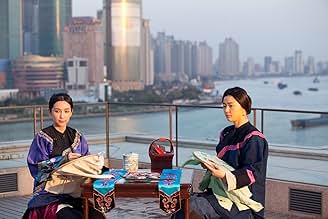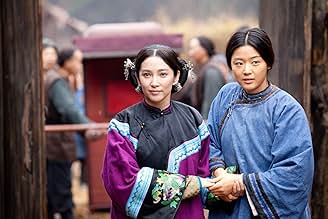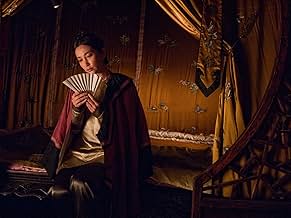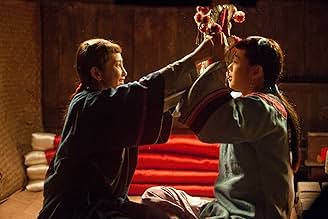IMDb रेटिंग
6.1/10
4.1 हज़ार
आपकी रेटिंग
अपनी भाषा में प्लॉट जोड़ेंA story set in nineteenth-century China and focusing on the life-long friendship between two girls who develop their own secret code as a way to contend with the rigid social norms imposed o... सभी पढ़ेंA story set in nineteenth-century China and focusing on the life-long friendship between two girls who develop their own secret code as a way to contend with the rigid social norms imposed on women.A story set in nineteenth-century China and focusing on the life-long friendship between two girls who develop their own secret code as a way to contend with the rigid social norms imposed on women.
- पुरस्कार
- 3 जीत और कुल 1 नामांकन
Jun Ji-hyun
- Snow Flower
- (as Gianna Jun)
- …
Hu Qing Yun
- Mrs. Liao
- (as Jingyun Hu)
Shiping Cao
- Mr. Wei
- (as Shi Ping Cao)
फ़ीचर्ड समीक्षाएं
One of the key discoveries in my life is that for me and for many of my women friends, our friendship is often the most wonderful gift of life. This movie celebrates friendship among women. It relates two stories of women in China whose friendship is signed as a contract, a laotong. Laotong, the movie explains, is a life-long relationship between women, often considered more important than marriage. The movie presents two young friends in Shanghai in the 21st century who celebrate a laotong. Their friendship is portrayed with the closeness, empathy and support that is well known about friendship among women. And it also presents the difficulties and distances that are very real and perhaps unavoidable in close relationships. In a similar way, the movie presents two 19th century women who had had a laotong in very different circumstances and for whom the friendship is also both a marvelous gift and a difficult relationship. Movies are often about relations between a man and a women but seldom about women friends. That is why this movie seems to be controversial. It is not always accepted that for women their women friends are their most rewarding relationships despite the complicated faces of any human partnership. Go see the movie. It shows a side of women's life that is amazingly real but poorly understood.
SNOW FLOWER AND THE SECRET FAN is the cinematic adaptation of Lisa See's popular novel by writers Angela Workman, Ron Bass and Michael K. Ray and director Wayne Wang. The film unveils parallel stories between 19th century China and present day Shanghai - the tales of two women joined by laotong - a binding vow and contract to be eternal friends and share each others lives - communicating with a secret women's language called nu shu, carefully inked characters placed on the folds between the spines of a silken fan. By using the same actresses to play the parts of the girls two centuries apart adds a mysterious beauty to the films alluring flavor.
In 1826 Lily and Snow Flower become laotung and though they are from opposite ends of the social stratum they become devoted friends, undergoing the ritual of having their feet broken and bound to remain very small as adults - apparently a desired attribute for physical attraction as a potential bride. The poor girl is chosen for marriage by a wealthy family and the rich girl is promised to a butcher, an extreme reversal of roles in society and it is the manner in which each adapts and aids the other that demonstrates the depth of the bond of laotong. Concurrently in the film we meet Nina and Sophie in contemporary Shanghai: Nina has gained education and stature and is due to move to New York as part of an important business. Sophie is in an accident and only slowly do we realize that Sophie had the promise of moving to Australia to marry an Aussie singer (Hugh Jackman), more because she is pregnant than for love. Because of the laotung between Nina and Sophie the two make sacrifices that overcome all else to prove their loyalty. There are many parallels in the two stories that show a bond between the two sets of girls and to capture this bond securely the two girls form centuries apart are played by the same actresses: Lily/Nina become the roles of Bing Bing Li and Snow Flower/Sophie are portrayed by Gianna Jun. The supporting cast is carefully chosen and uniformly fine.
The sets and costumes and music enhance this film significantly. It is not a great epic of a movie, but it has a tender and touching story that is very well told by everyone involved.
Grady Harp
In 1826 Lily and Snow Flower become laotung and though they are from opposite ends of the social stratum they become devoted friends, undergoing the ritual of having their feet broken and bound to remain very small as adults - apparently a desired attribute for physical attraction as a potential bride. The poor girl is chosen for marriage by a wealthy family and the rich girl is promised to a butcher, an extreme reversal of roles in society and it is the manner in which each adapts and aids the other that demonstrates the depth of the bond of laotong. Concurrently in the film we meet Nina and Sophie in contemporary Shanghai: Nina has gained education and stature and is due to move to New York as part of an important business. Sophie is in an accident and only slowly do we realize that Sophie had the promise of moving to Australia to marry an Aussie singer (Hugh Jackman), more because she is pregnant than for love. Because of the laotung between Nina and Sophie the two make sacrifices that overcome all else to prove their loyalty. There are many parallels in the two stories that show a bond between the two sets of girls and to capture this bond securely the two girls form centuries apart are played by the same actresses: Lily/Nina become the roles of Bing Bing Li and Snow Flower/Sophie are portrayed by Gianna Jun. The supporting cast is carefully chosen and uniformly fine.
The sets and costumes and music enhance this film significantly. It is not a great epic of a movie, but it has a tender and touching story that is very well told by everyone involved.
Grady Harp
I finished reading all the previous reviews to have a clear idea about what other people saw in this movie, and I must say that all that emphasis about the film being too different from the book doesn't show a great understanding of the cinematic technique. A movie is not a book. The visual, with long shots and close ups, the dialogue and the music, even the noises, take over all the written pages to express a single gesture, the full description of a landscape, or the design of a dress. A single close up can give us the essence of a full chapter.
This movie is sheer poetry.
Forget about the original book that helped to create this jewel of a movie, just watch this film, allow your senses to be absorbed by the two parallel stories --the contemporary and the historical-- and just absorb all that beauty offered to you in the story-line, the exquisite photography, the delicacy of sentiments expressed by these women (it is a terrible film for men's egos, because we come a very poor second compared with those women, overpowered by men's brutality and yet transcending the horrible handicaps imposed on them, like the tiding of their feet from early age, to convert them into defenseless crippled creatures, totally depending on men, and their virtual slaves for life).
The image of those bounded stomps, deformed to the point of becoming unrecognizable as human feet symbolizes too the humiliation some ultraconservative elements of society try to impose over minorities as if to say: "There, you'll go thru life bounded and suffering, freedom to be yourself will be denied to you because I want it so".
The total love among these "Sisters for life" was infinitely superior to the love these women could have had for their husbands. We see that in both cases --the historic and the contemporary-- and in both cases it lasted, strong, to the last consequences.
Contrary to other viewers, I didn't have the slightest problem in following the development of the two parallel stories, since it was done in a very natural, simple and honest way; both stories superbly intertwined to perfection till the final resolution.
¿A masterpiece? yes, I think so.
This movie is sheer poetry.
Forget about the original book that helped to create this jewel of a movie, just watch this film, allow your senses to be absorbed by the two parallel stories --the contemporary and the historical-- and just absorb all that beauty offered to you in the story-line, the exquisite photography, the delicacy of sentiments expressed by these women (it is a terrible film for men's egos, because we come a very poor second compared with those women, overpowered by men's brutality and yet transcending the horrible handicaps imposed on them, like the tiding of their feet from early age, to convert them into defenseless crippled creatures, totally depending on men, and their virtual slaves for life).
The image of those bounded stomps, deformed to the point of becoming unrecognizable as human feet symbolizes too the humiliation some ultraconservative elements of society try to impose over minorities as if to say: "There, you'll go thru life bounded and suffering, freedom to be yourself will be denied to you because I want it so".
The total love among these "Sisters for life" was infinitely superior to the love these women could have had for their husbands. We see that in both cases --the historic and the contemporary-- and in both cases it lasted, strong, to the last consequences.
Contrary to other viewers, I didn't have the slightest problem in following the development of the two parallel stories, since it was done in a very natural, simple and honest way; both stories superbly intertwined to perfection till the final resolution.
¿A masterpiece? yes, I think so.
While no match for some of Wayne Wang's other movies, I'd call "Snow Flower and the Secret Fan" worth seeing nonetheless. It tells the story of two friends in present-day Shanghai, and the connection that they have with two girls in 19th century China through a fan on which they wrote secret messages.
Wang famously focused on Chinese-American families in "The Joy Luck Club", and took a bittersweet look at people's lives in "Smoke". This movie doesn't equal either of those, but I still recommend it. The development of Shanghai certainly reflects the changes in the lives of the girls (and the changes that China has undergone over the past 100 years). Not great, but worth seeing.
Wang famously focused on Chinese-American families in "The Joy Luck Club", and took a bittersweet look at people's lives in "Smoke". This movie doesn't equal either of those, but I still recommend it. The development of Shanghai certainly reflects the changes in the lives of the girls (and the changes that China has undergone over the past 100 years). Not great, but worth seeing.
Sunflower and the Secret Fan is the poignant tale of two 21st century Asian girls and their matches in the 19th century: Both couples are bound by the dictates of a patriarchal culture that challenges the natural love and devotion they feel for each other. These lady laotongs or "old sames" take an oath to make them faithful sisters forever, the outward show of an enduring, lifelong commitment to their sisterhood.
Director Wayne Wang's challenge is to intercut the centuries and women without confusing the audience, a virtue not always achieved in two hours of traversing between times. His limited success can be attributed to the striking skyline of modern Shanghai, an apt metaphor for the change in the ladies' lives, indeed for change itself.
Just as arresting as the visual images is the stringed music of Rachel Portman, which dictates emotions as strongly as any other score I have heard this year. Some might complain of manipulation; I enjoy the excess as if it were an ancient Chinese fan of innumerable design. BTW, the titular fan was used by the 19th century ladies to make messages to each other in their special language. Wang's considerable success showing devoted friends in Joy Luck Club is evidenced in the ladies here.
The bonding of protagonists is strong on the surface, but because there is so much to do in only 2 hours, we never have sustained conversation among them to verify what we intuit without much dialogue. It would be sweet to linger more with them while they show through dialogue the bond that makes them sacrifice for each other throughout their lives.
Snow Flower and the Secret Fan in the end turns on love, its many forms and demands and on change, which frequently derails the best intentions of love itself. The ladies here evidence in delicate ways the tumult and reward accompanying a lifelong commitment to another human being. And that's no secret.
Director Wayne Wang's challenge is to intercut the centuries and women without confusing the audience, a virtue not always achieved in two hours of traversing between times. His limited success can be attributed to the striking skyline of modern Shanghai, an apt metaphor for the change in the ladies' lives, indeed for change itself.
Just as arresting as the visual images is the stringed music of Rachel Portman, which dictates emotions as strongly as any other score I have heard this year. Some might complain of manipulation; I enjoy the excess as if it were an ancient Chinese fan of innumerable design. BTW, the titular fan was used by the 19th century ladies to make messages to each other in their special language. Wang's considerable success showing devoted friends in Joy Luck Club is evidenced in the ladies here.
The bonding of protagonists is strong on the surface, but because there is so much to do in only 2 hours, we never have sustained conversation among them to verify what we intuit without much dialogue. It would be sweet to linger more with them while they show through dialogue the bond that makes them sacrifice for each other throughout their lives.
Snow Flower and the Secret Fan in the end turns on love, its many forms and demands and on change, which frequently derails the best intentions of love itself. The ladies here evidence in delicate ways the tumult and reward accompanying a lifelong commitment to another human being. And that's no secret.
क्या आपको पता है
- ट्रिवियाRupert Murdoch personally asked Fox Searchlight to release this film in North America.
- गूफ़The last paragraphs of the unsent letter that Nina found in Sophias apartment, which can be seen when she closes the notebook, don't match Nina's voice-over.
- कनेक्शनReferenced in Conan: A Tree with Dutch Elm Disease Grows in Brooklyn (2011)
टॉप पसंद
रेटिंग देने के लिए साइन-इन करें और वैयक्तिकृत सुझावों के लिए वॉचलिस्ट करें
- How long is Snow Flower and the Secret Fan?Alexa द्वारा संचालित
विवरण
बॉक्स ऑफ़िस
- बजट
- $60,00,000(अनुमानित)
- US और कनाडा में सकल
- $13,48,205
- US और कनाडा में पहले सप्ताह में कुल कमाई
- $1,34,005
- 17 जुल॰ 2011
- दुनिया भर में सकल
- $1,13,48,205
- चलने की अवधि
- 1 घं 44 मि(104 min)
- रंग
- ध्वनि मिश्रण
- पक्ष अनुपात
- 2.35 : 1
इस पेज में योगदान दें
किसी बदलाव का सुझाव दें या अनुपलब्ध कॉन्टेंट जोड़ें

































